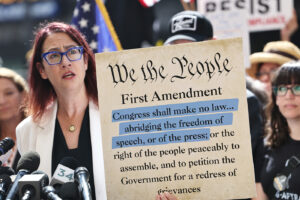March 6, 2024
Learn How To Advocate for Yourself
By John Myers
By Huifen Li
With her heart beating out of her chest, she is shocked into silence by the profession of love from the boy who’s been consuming her thoughts. She has no clue how to react, nor how to process the words that she just heard. While she is freaking out internally, the one who has just professed his feelings for her waits impatiently. After a long pause, and with a wide grin on her face, her response starts their short lived relationship.
Hazel was happy. Naturally, as her friend, this also meant I was happy. The love and care he showed her made her feel special. He had been the topic of our discussions for a few weeks so I knew that she liked him too. I wasn’t certain that he was suitable for her, but he was who she wanted. As a spectator who did not have on rose-colored glasses, I should have known better. I should have seen him for who he was from the beginning – a narcissist whose scummy personality really began showing throughout the development of their relationship. Without the support of healthy and effective communication, the relationship turned sour. The over-romanticized lens that she had on did not help either.
Their frequent fighting, which he always instigated, placed me in a difficult position. I knew how much she liked him, but I also knew how much he would continue to hurt her if he kept being overly jealous and possessive. Whenever I called him out on his behavior, he would retaliate by shifting the blame to Hazel with the statement that if she wasn’t playing around with other guys, he wouldn’t fight with her. Her chats with these guys were only friendly. When I got angry at him for even daring to accuse her of that, Hazel would argue with me and refuse to listen to me, telling me that I didn’t know anything about their relationship. She was under so much pressure. My warnings against marinating in his toxicity fell on deaf ears.
Intimate partner violence expert, Maeven McGovern, describes the basis of this problem as an unbalanced power dynamic in the relationship, in which one partner has more power and control over the other. When I described the issue to her, she agreed that this was a case of intimate partner violence, as “even when he’s not around he’s still there in her head, and she still has to act the way that he wants her to act.” While I knew that he was in the back of her mind, as she began distancing from our friend group and talking to him more, I still couldn’t do anything about it.
“He didn’t like my enthusiasm on things, so whenever I talked about something I liked,” she paused to scoff and roll her eyes, “he would change the conversation to something more inclusive to him.” At the time, she did not realize that he was doing this because she was happy with talking with him about anything, as long as they talked. In indulging his behavior, she never got the chance to talk about anything she wanted, nor the chance to communicate the issues she had with their relationship.
The safe space I tried to provide for her finally reached her when she expressed concerns about her relationship to me. Together, we devised a scheme to test whether or not he was loyal to only her, as we suspected that he had been unfaithful, but were not sure. In only a matter of a few days, the plan succeeded – though we were unhappy with the results. On their 100th day anniversary, her suspicions were confirmed as he cheated on her with another friend of ours, who we had recruited to our cause, by flirting with her excessively and asking her if she could satisfy him. This was the final straw as Hazel knew then that they could never have the perfect relationship that she had dreamed of having. To mark the new year and a new start, she broke up with him. The happiness and pride I felt for her for overcoming this obstacle was incomparable to the happiness I initially felt when she first began dating him.
Hazel later explains that it was new, “uncharted territory, dating someone for the first time.” And she decided to first begin dating him because she “wanted the action of being in a relationship like other people.” She didn’t mind entering a relationship with him because she liked him back, but even now she admits that she got lost in the thrill and was not ready for a relationship at the time. The decision she made after knowing him for only 168 days is one that would clash with the mindset of another friend of mine, Lilah.
Hopeless romantic as she is, Lilah has decided to “wait for the one to come in and sweep me off my feet,” surpassing the bare minimum because she knows her worth. For the time being, however, she will focus on herself. Although a few have pursued her, she took her time in getting to know them without jumping into a relationship immediately when they asked. This played in her favor in the end, as they all turned out to be different from who she originally thought they were.
Her mindset aligns with some advice given by McGovern: “You wanna feel like you really know the person before making that commitment, so however long that takes: to feel like you know them, your friends know them, you feel like they’re integrated into your life as opposed to having a separate life.” A healthy, nurturing relationship is defined by communication and effective boundaries that both parties follow. Once you get to know someone, where you can communicate and set boundaries, then there is hope for a lasting relationship.


